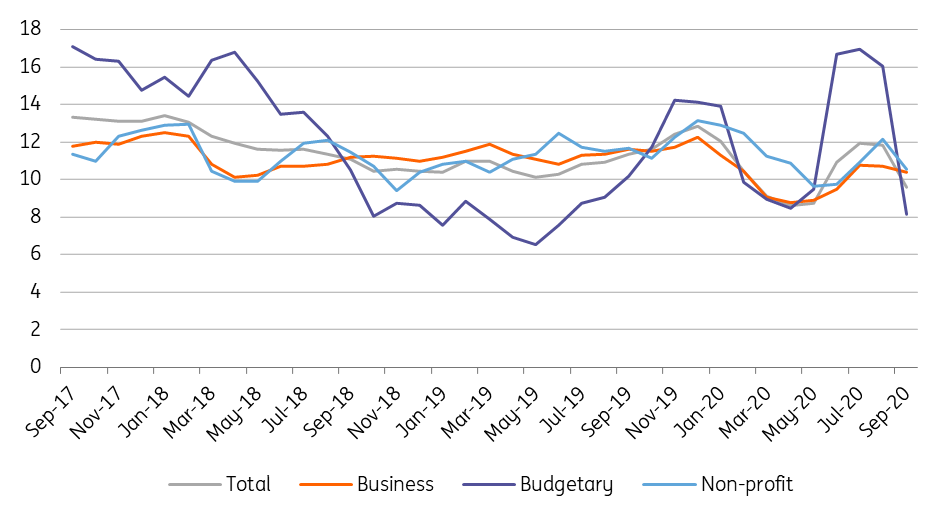Hungarian wages are still rising
The almost double-digit wage growth continues in Hungary, but the public sector is slowing the pace of growth. Expect a fierce debate around minimum wage in 2021
| 8.8% |
Average gross wages (YoY)Previous 9.1% |
Hungarian gross and net wages rose by 8.8% year-on-year in September, depicting the slowdown since the summer. This data is much closer to the underlying wage dynamic, which we can trace with regular wage growth. Wages without one-off premiums and bonuses increased by 8.6% YoY in September.
The slowdown in wage growth is mainly due to the phasing-out of the one-off increases in the healthcare sector while the previous wage settlement is now in the base. This means that wages in healthcare were up by only 3% YoY in September. In contrast, salaries in the education sector rose by double-digit as the new round of wage settlements kicked in.
Against this backdrop, public sector wage growth came in at 6.5% YoY, which is still not bad in a pandemic but the lowest growth rate since April 2019.
Wage dynamics (3-month moving average, % YoY)

Private sector wages remained more or less unchanged from the previous month showing a 9.8% YoY figure in September.
According to the Statistical Office, construction sector and professional, scientific activities showed an above-average increase, but wage growth remained decent in retail and manufacturing.
Wage negotiations have just started and are facing several hurdles
The storyline has remained the same: composition effect, wage settlements in the public sector and “legacy” wage growth in the private sector shape wage dynamics this year.
A huge gap ahead
Going forward, we expect a fierce debate between employees and employers when it comes to the minimum wage in 2021.
The negations have just started and employees want to see a 10% increase, while corporates are suggesting no increase due to the crisis. There is an agreement in place between the government and employers (made in late 2016) which says real wages will increase by 6% on a yearly basis and then social contribution tax will be further cut by 2ppt.
These recommendations and agreements are likely to cause serious tensions as they don't take into account the fact that each sector bears the burden of the crisis differently.
Against this backdrop, next year’s nominal wage growth could be around 5-6% if we are optimistic.
This publication has been prepared by ING solely for information purposes irrespective of a particular user's means, financial situation or investment objectives. The information does not constitute investment recommendation, and nor is it investment, legal or tax advice or an offer or solicitation to purchase or sell any financial instrument. Read more
Tags
HungaryDownload
Download snap